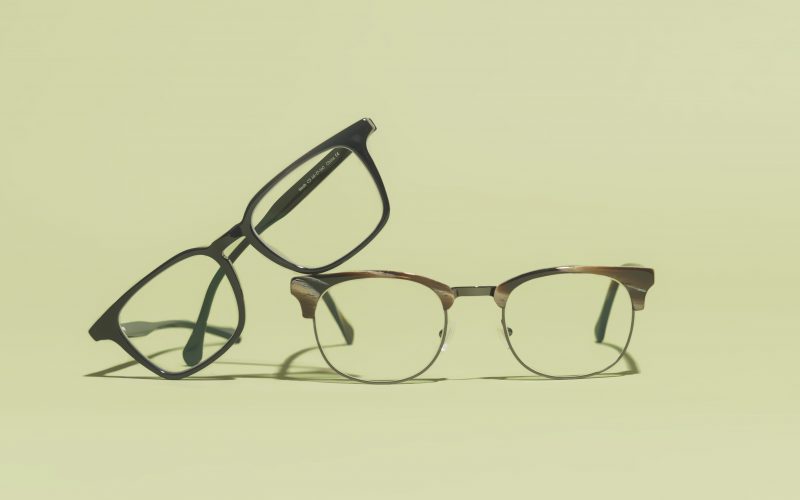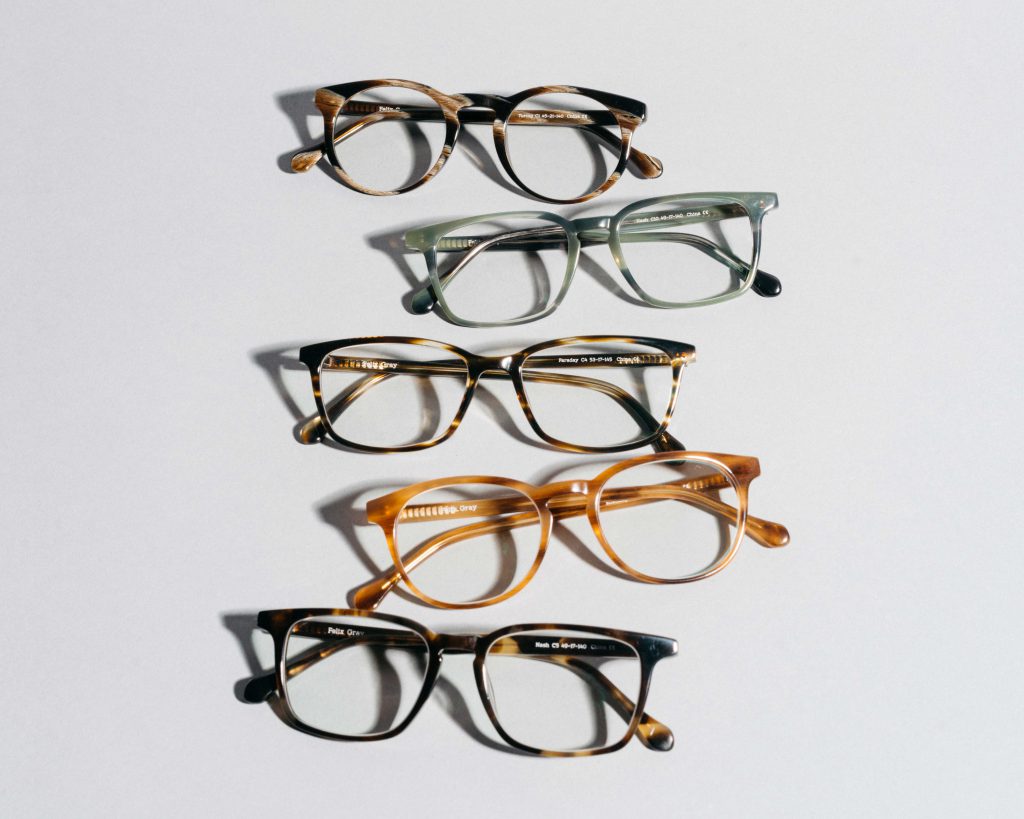According to Jobson Research, 61% of the United States population wears eyeglasses or contacts to correct their vision, even if only slightly. Some people may need glasses just for reading, while others may need glasses for more serious conditions like astigmatism. If you—like most of us—aren’t lucky enough to have 20/20 vision, then chances are you have a very important decision to make: glasses or contacts?
It is an age-old question that doesn’t have a simple answer. You can ask your eye doctor, your family, or your friends, “should I get contacts?” but it really comes down to personal preference. However, it is still hard to decide whether to wear contacts or glasses. There are both pros and cons of contact lenses and glasses and this article will provide a list of both the benefits and drawbacks of contact lenses vs. glasses.
Here are the pros and cons of contacts that can help you figure out what’s right for you!

Pros of contacts vs. glasses
- Good for Activities: Contact lenses are the best for pastimes like sports and outdoor activities because they won’t get in the way or fall off. Contacts allow you to move freely without worrying about your glasses sliding around. Wearing glasses during activities also comes with the constant worry that your specs will get damaged or break, and contact lenses take away that worry. Overall, they make exercising and sports easier because of their flexibility.
- Better Vision: Contact lenses are unique because of the contact molds directly to the shape and curve of your eye. This gives you a wider field of vision meaning you can see better and there are fewer obstructions than when wearing glasses. Glasses can sometimes get in the way during certain activities that contact lenses will not. Contacts allow your eye to focus more clearly. Some people also find that they provide a more comfortable fit.
- Creativity: Contacts allow you to experiment with your creativity in terms of your eye color. You can switch it up with colored contacts when you want to try out a different eye color from what you have. It can also be great for Halloween and other special events in addition to everyday wear. Maybe you have brown eyes and have always wondered what it’s like to have green eyes? Well, you can easily find out by using colored contacts.
Here are the disadvantages of wearing contact lenses:
- Hard to apply: A contact lens can be challenging to get into the eye because its slippery, small, and an odd shape. They take a lot of practice to get right. Don’t be discouraged if you mess it up the first couple of times. Because of this, contact lenses are usually recommended to independent individuals who can be trusted to administer the lens themselves without assistance. This usually means young teen years will be the first time someone tries contact lenses. This is something to consider when deciding whether or not contact lenses are the right choice for you.
- Dry eyes: Contact lenses can have many unfortunate consequences, but dry eyes is one of the worst. After the lens has been on your eye all day, it can irritate your eyes and dry them out. This is a very uncomfortable feeling for many individuals. There is a lack of oxygen entering the eye due to the contact, which is why the eye can become dry. Additionally, dry eye can be caused when you sleep in your contacts. Contacts need to be replaced frequently and, if they are not, they can cause dry, red, and irritated eyes. This is another disadvantage of wearing contact lenses every day and something to think about when making your decision.
- Extra care: Contact lenses require more care and attention than most glasses do. As mentioned above, they need to be changed regularly to prevent infection but also just for your comfort. They need to be cleaned in contact solution to make sure that nothing unwanted sneaks into your eye. There are different types of contacts that can either be changed daily, weekly, or monthly and you must figure out what works best for you and your schedule. Eyecare, especially with contacts, must come into extra consideration when deciding whether or not to wear contacts.
Many people often ask, “are contacts better than glasses?” and this outline has revealed there are both positives and negatives to contacts. It is not as clear cut as many may think. A lot of people assume that contacts will always win, but glasses are not automatically out in the contact lenses vs. glasses debate. Now we will discuss the advantages and disadvantages of glasses so we can further investigate glasses vs. contacts.
Pros of glasses
- Protect the eye: Because of the way that glasses sit on your face, they act as a protectant of your eye area. They naturally prevent objects from entering your eyes and harming you. This is very helpful because obviously we never want dust, sharp objects, or any debris to enter our eyes. We all know how annoying and sometimes painful it can be to get something in our eyes so glasses are an easy way to prevent that. The wind also won’t bother your eyes as much when you’re wearing glasses since the lenses act as a blocker between the elements and your eyes. All in all, glasses are a way to improve your vision while also protecting your eyes from the outside world.
- Fashion statement: One big advantage of glasses is that they are a great accessory! They add a nice touch to any outfit and make you stand out in a crowd. The best part about glasses is you can pick a shape that compliments you and a color that looks great on you too. Glasses add something to an outfit that nothing else can. They add professionalism, quirkiness, fun, and fashion to any outfit. It is a nice way to spice up your life while also helping your vision!
- Less expensive: Another big advantage of glasses is that they are, more often than not, less expensive than contact lenses. Glasses do not need to be replaced as often as contact lenses unless they are broken (which thankfully doesn’t happen too often). Contacts, on the other hand, need to be replaced quite frequently. Unless your prescription changes drastically or you just decide that you want a new pair, then you can keep your current pair of glasses for an extended period of time. This will obviously cut down on costs for your eyewear.
Cons of glasses vs. contacts
- Vulnerable to conditions: Unfortunately, glasses, because they are out in the open, are vulnerable to the elements. They can get wet from rain or any water and/or fog up from steam and heat. This can be annoying because you constantly have to readjust and clean your glasses. It also hinders your vision, which can be dangerous while walking or driving around. This is a reason why contacts can be the better choice because they’re not as susceptible to the outside world.
- Uncomfortable to wear: Depending on your face shape and personal preference, glasses can sometimes feel uncomfortable on your face. They may feel heavy on your nose, pinch your nose, slide down your face, or rest too much on your cheekbones. All of these combined or separately can be irritating and slightly painful, so it is understandable why you might not want to wear glasses. Glasses can also be tight around the head or behind the ears if you don’t have the right fit, which can make you want to take the glasses off. This can also cause headaches which are never fun. If glasses can be awkward to wear, then it is probably not the best choice for you. However, you could just need to try a different shape of frames to better fit your face shape. The right pair of glasses could alleviate any discomfort you previously felt from glasses and make glasses an enjoyable experience again!
- Don’t like the look: Frankly, some people just don’t like the way glasses look on them. They may feel that they ruin their “look” or they just aren’t for them. Glasses also do hide parts of your face solely because of their shape and their placement on the face. People might not like that they cover parts of their face that they want to highlight (for example, their eyes or their eyebrows). Glasses can also hide makeup or tend to mess up makeup that people put a lot of time and effort into. That can be seen as a disadvantage to many people.
Overall, in the contacts vs. glasses debate, there are many pros and cons to consider. There are many questions to ask yourself when asking yourself are contacts worth it or are glasses the better choice for me? We have listed many reasons why both are good and smart choices to, hopefully, make your decision a little bit easier. If you decide glasses are for you, we at Felix Gray offer an assortment of Blue Light filtering glasses available in prescription glasses, non-prescription, readers, and kids’ glasses!

